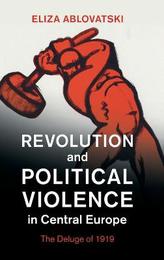
|
Revolution and Political Violence in Central Europe: The Deluge of 1919
Hardback
Main Details
Description
In the wake of the First World War and Russian Revolutions, Central Europeans in 1919 faced a world of possibilities, threats, and extreme contrasts. Dramatic events since the end of the world war seemed poised to transform the world, but the form of that transformation was unclear and violently contested in the streets and societies of Munich and Budapest in 1919. The political perceptions of contemporaries, framed by gender stereotypes and antisemitism, reveal the sense of living history, of 'fighting the world revolution', which was shared by residents of the two cities. In 1919, both revolutionaries and counterrevolutionaries were focused on shaping the emerging new order according to their own worldview. By examining the narratives of these Central European revolutions in their transnational context, Eliza Ablovatski helps answer the question of why so many Germans and Hungarians chose to use their new political power for violence and repression.
Author Biography
Eliza Ablovatski is Associate Professor and Chair of the Department of History at Kenyon College. Ablovatski is a historian of central and eastern Europe interested in gender and Jewish history. She is the co-author of three books of oral histories of Jews from Czernowitz, including Zwischen Pruth und Jordan. Lebenserinnerungen Czernowitzer Juden (2003) and ' - und das Herz wird mir schwer dabei': Czernowitzer Juden erinnern sich (2009).
Reviews'Ablovatski offers a bold comparison of the revolutions of 1919 in Munich and Budapest, situating both in the crisis of war, defeat and post-war longings for transformation of governance. Although both revolutions failed in 1919, contests over the meanings and memories of revolution shaped interwar political culture in both Hungary and Bavaria. Most significant in this study of revolution is Ablovatski's compelling explication of the counter-revolution that followed, one held together by anti-Semitic and nationalist ideology and manifested through new forms of political violence that would profoundly reshape the political landscape of Central Europe.' Kathleen Canning, Rice University 'The revolutions that erupted in Budapest and Munich in 1919 cast a long shadow over the history of Central Europe. Drawing on compelling analysis of post-revolutionary trial records, Eliza Ablovatski offers a riveting and insightful account of the political myth-making that shaped transitional justice in both cases. A significant contribution to our understanding of this tumultuous period.' Paul Hanebrink, Rutgers University 'In this splendid transnational history Eliza Ablovatski traces the ways that contemporaries used language to understand the disorienting experiences of revolution and counterrevolution in Budapest and Munich following the First World War. Yielding gripping narratives and surprising case studies, Ablovatski's analysis reveals that the violence experienced in 1919-1920 was not so much a psychological product of the brutalization of World War, but instead had deep roots in community anxieties common to pre-war Central Europe.' Pieter M. Judson, European University Institute
|